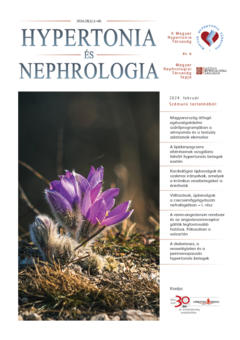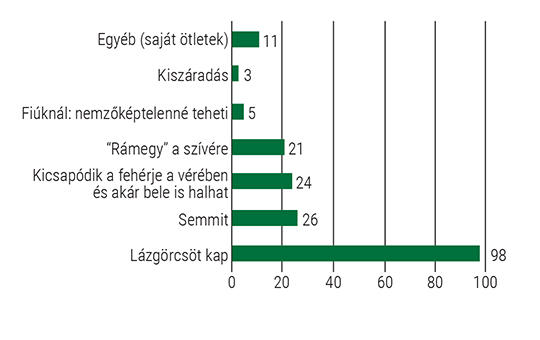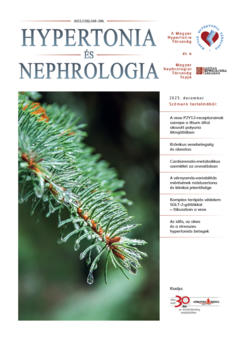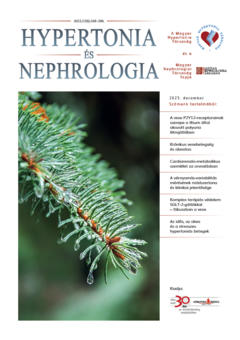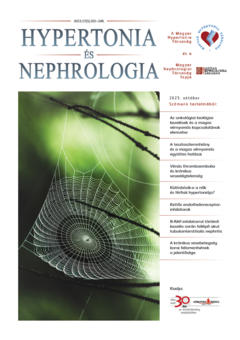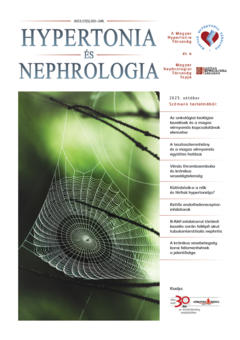The eLitMed.hu medical portal uses computer cookies for convenient operation. Detailed information can be found in the Cookie-policy.
Specialities
Infectology
[Changes/new developments in pediatric nephrology I. – Vesicoureteral reflux (VUR)]
[In the case of vesicoureteral reflux (VUR), the abnormal backflow of urine from the bladder to the kidneys increases the risk of pyelonephritis and, in severe cases, causes kidney damage.]
[Decreasing Fever now and then: The Past Living with us]
[To assess lay parents’ knowledge and attitudes towards fever; to find out to what extent they know and use fever control recommendations for their children; to assess whether the perceptions of parents who manage their children’s fever independently have changed. And to put this snapshot into context, it summaries how the perception of fever has changed through history to the present day.
The cross-sectional study was conducted between November 12, 2022 and December 24, 2022 through self-constructed online questionnaire among non-medical parents.
Most parents are not even aware of the basic concepts. If they do not have to manage their own fever, but their child’s, they will begin to reduce the fever much sooner. 58% of those surveyed also use physical methods (compresses, cooling baths) in addition to medication. Many misconceptions about fever persist. There is an opinion among parents that it is better to consult a physician than to manage fever on your own.
Disseminating knowledge about fever and tackling misconceptions would be vital to reduce the burden of overused emergency care.]
[Chronic kidney disease and obesity]
[Nowadays, the epidemic spread of obesity is mainly linked to changing environmental factors and is a serious public health problem. Obesity alone can be associated with increased mortality, but obesity is also an independent risk factor for several chronic diseases such as diabetes, hypertension and chronic kidney disease which have a major public health burden.]
[Complex therapeutic protection with SGLT2 inhibitors, focusing on the kidney]
[In the EMPA-REG Outcome trial, it was already observed that cardiovascular (10.5% vs. 12.1%) and renal (1.7% vs. 3.1%) outcomes were better with empagliflozin treatment compared to placebo. The favorable effects of empagliflozin were consistent across the KDIGO risk categories. CVOT trials conducted with other SGLT2 inhibitors also concluded with promising renoprotective results.]
[High blood pressure and low testosterone levels both increase the risk of cardiovascular disease and alter the morphology and function of blood vessels]
[Both hypertension and andropause alone increase the risk of cardiovascular disease. The incidence of both diseases increases with age. As a consequence they may often present concurrently in men. The damaging effects of the two noxae may add up - this may be observed in the remodeling processes of coronary resistance vessels. This mini-review summarizes the effects of hipertension, testosterone deficiency and the combined effects of these two noxae on the morphological, biomechanical and functional adaptation of coronary resistance vessels, as well as on cardiovascular diseases.]
[Chronic kidney disease and venous thromboembolic events]
[Our aim is to analyse venous thromboembolic events regarding chronic kidney disease. Based upon epidemiologic data, both thromboembolic and haemorrhagic events are more frequent among patients with chronic kidney disease. Changes in levels of coagulant factors, thrombocyte and endothel disfunction, uremic toxins and dialysis related issues share role in pathogenesis. Guidelines lack of adequate information regarding this specific patient group. Therapeutic shift can be observed from vitamin K antagontists toward direct oral anticoagulants, not only in general population but also in CKD patients, with special interest in apixaban. Another therapeutic trend is change from unfractioned heparin to low molecular weigh heparins with anti Xa level monitoring among CKD population. Special attention is needed for thrombotic events related to eritropoietin therapy and hemodialysis access.]
1.
Clinical Neuroscience
Is there any difference in mortality rates of atrial fibrillation detected before or after ischemic stroke?2.
Clinical Neuroscience
Factors influencing the level of stigma in Parkinson’s disease in western Turkey3.
Clinical Neuroscience
[The effects of demographic and clinical factors on the severity of poststroke aphasia]4.
Clinical Neuroscience
Neuropathic pain and mood disorders in earthquake survivors with peripheral nerve injuries5.
Journal of Nursing Theory and Practice
[Correlations of Sarcopenia, Frailty, Falls and Social Isolation – A Literature Review in the Light of Swedish Statistics]1.
2.
3.
4.
5.
